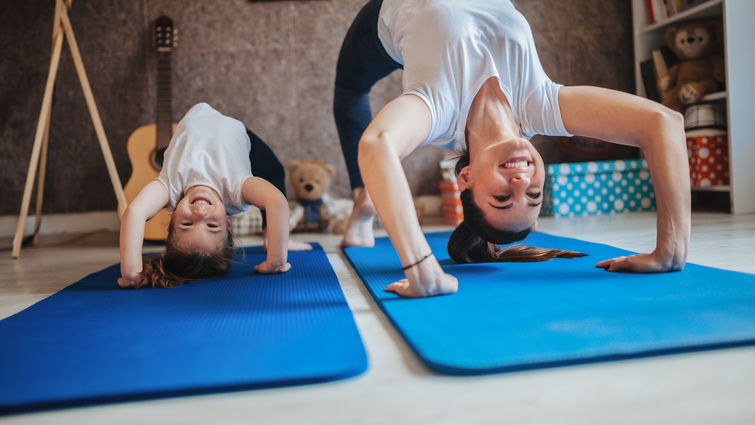
During this unique time of social distancing and sheltering-in-place, the question many are asking is, “How do I stay healthy?”
Dean Sherzai, MD, MPH, and Ayesha Sherzai, MD, MAS, co-directors of the Brain Health and Alzheimer’s prevention program at Loma Linda University Health, say that it is not only possible to maintain your whole-person health, but it is also is vital during pandemics such as the COVID-19 outbreak.
“These are stressful times,” Ayesha says, “But with the right management tools, there are boundless opportunities to be stress-free and rebuild your healthy habits.”
Ayesha adds that while it may not feel within our control during crises, we do have the power to maintain our whole-person health during them. The Sherzais have developed NEURO, a lifestyle-focused approach to preventing Alzheimer’s and improving brain health. The comprehensive program empowers individuals to take control of their brain health by improving five areas of impact: nutrition, exercise, unwinding, rest and optimizing.
While it may feel overwhelming, the Sherzais say the best place to begin their plan is managing stress or unwinding. “When we talk about NEURO, we say everything starts at ‘u’ in the middle. It has to start with managing your emotions, stressors and mindset, because if there is no management, nothing else will take place,” Dean says.
As we continue in this time of home isolation, the Sherzais offer these considerations.
Managing stress personally and as a family is key.
The Sherzais say management of stress begins by first defining your situation, defining what is affecting your situation, and then managing those systematically. For example, if you are immune-compromised, it is more than just that, you have to consider all the elements that affect it. Are you stressing over access to medications for your health? Are you stressing over having the right food to keep your immunity boosted? Are you thinking about your family possibly putting your immunity at risk? Once you have those stressors defined, you can focus on taking steps to destress.
First, you will prioritize and focus on the ones that impact you. With each priority stress, work on eliminating or redirecting it. In the example of the immune-compromised, the individual may prioritize access to medication and food and can eliminate that stressor by redirecting it and asking for help from family members to deliver these things. If they are worried about outside impact on their immunity, they can have the family member practice social distancing upon delivery, thereby eliminating it.
So, when in doubt for stress management, the steps to remember are:
- Define
- Prioritize
- Reduce/ Redirect
- Eliminate
Dean adds as a result of the absence of the day-to-day activity during this pandemic, it is easy for the mind to exaggerate small problems, become upset and misappropriate existing stressors.
“If you don’t have all the structures like these set-in place, you will be overwhelmed emotionally during times like this of excess stress,” Dean says. “Most importantly for parents, it’s critical they have their stress under control and can demonstrate it to their children positively because it’s stressful situations like this that will determine how they handle stress in the future.
Creative activities, learning and socialization are necessary.
While we may be practicing social distancing and isolation at home, Dean says the worst thing we can do to ourselves is to socially and intellectually isolate ourselves. When we do, the brain can instantly regress into its own world of stress and anxiety. “With the access we have to technology, now is the time to be both creative and connected for support,” Dean says. “Art and connectivity are vital to maintaining stress during difficult times.”
The Sherzais recommend some of the following activities:
- Creating a Facebook group book club and virtually discuss the book
- Write a song or learn to play an instrument, film it and share it on YouTube
- Play card games or chess with friends using virtual games or Facetime
- Join a group workout class online or learn a new dance
- Paint with your family members and share it on social media
- Take online classes in subjects that interest you.
Use this time to rebuild lasting healthy habits.
With the hustle that everyday life brings, we often lose out on time to exercise, cooking fresh food and getting restorative sleep. The Sherzais say this is the time to build both immunity and routine for the whole. So, what does that look like?
- Sticking to a sleep schedule by getting exactly eight hours and consistently waking and resting at the same time.
- Ensuring 150 minutes of exercise a week. Whether you’re outside for fresh air with a brisk walk as a family, finding a kickboxing class online or daily yoga, be sure to prioritize exercise in the home.
- Movement every hour. Yes, that means theoretically you can stand and watch TV to get movement in, but the Sherzais recommend walking around, stretching, and doing squats.
- Cooking as a family is a great way to bond while also providing an opportunity to understand our relationships with food and raising awareness around what the body needs to eat during quarantine as well as other times.
The Sherzais urge families to stay up-to-date on COVID-19 by visiting the CDC website. You can also visit our coronavirus website to see facts and preventative tips to keep you and your family healthy.
